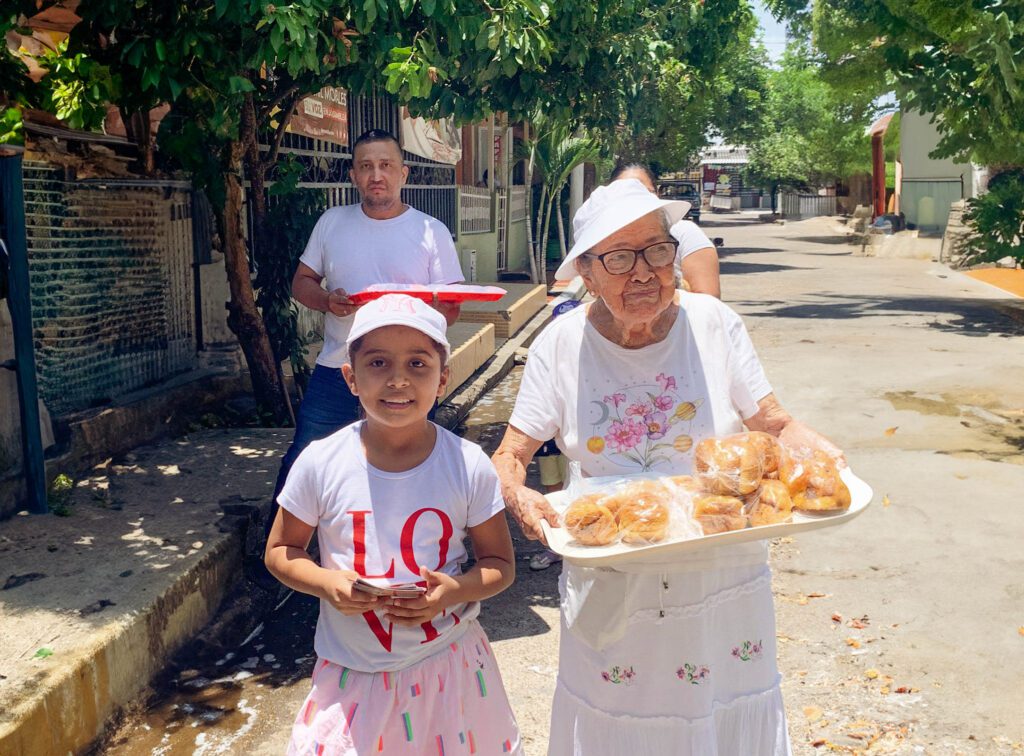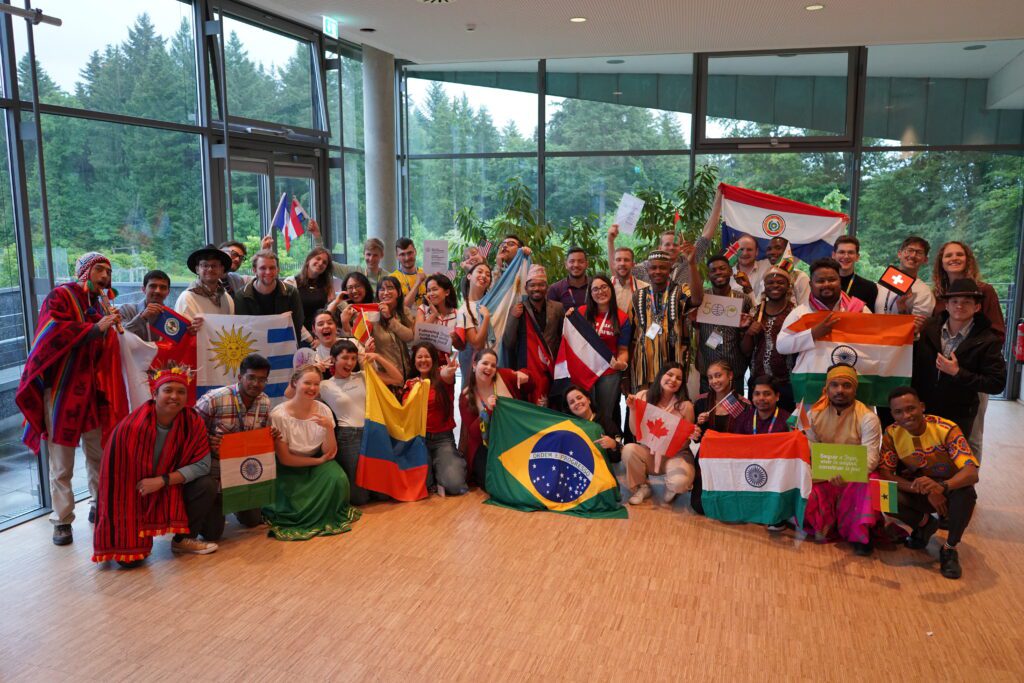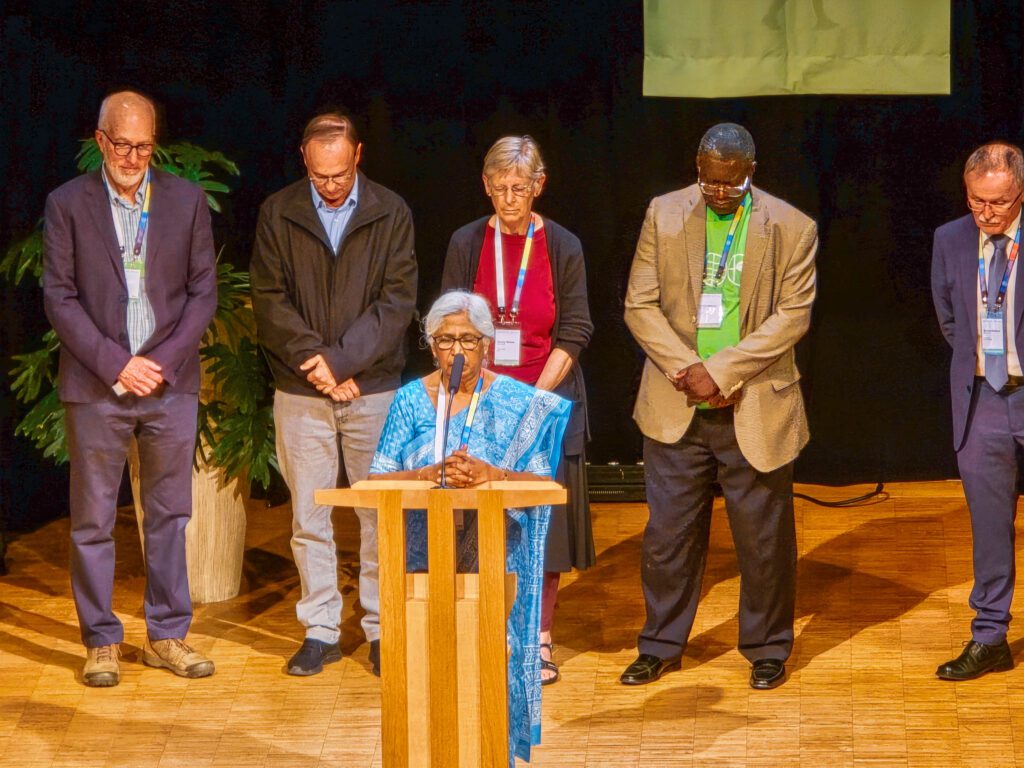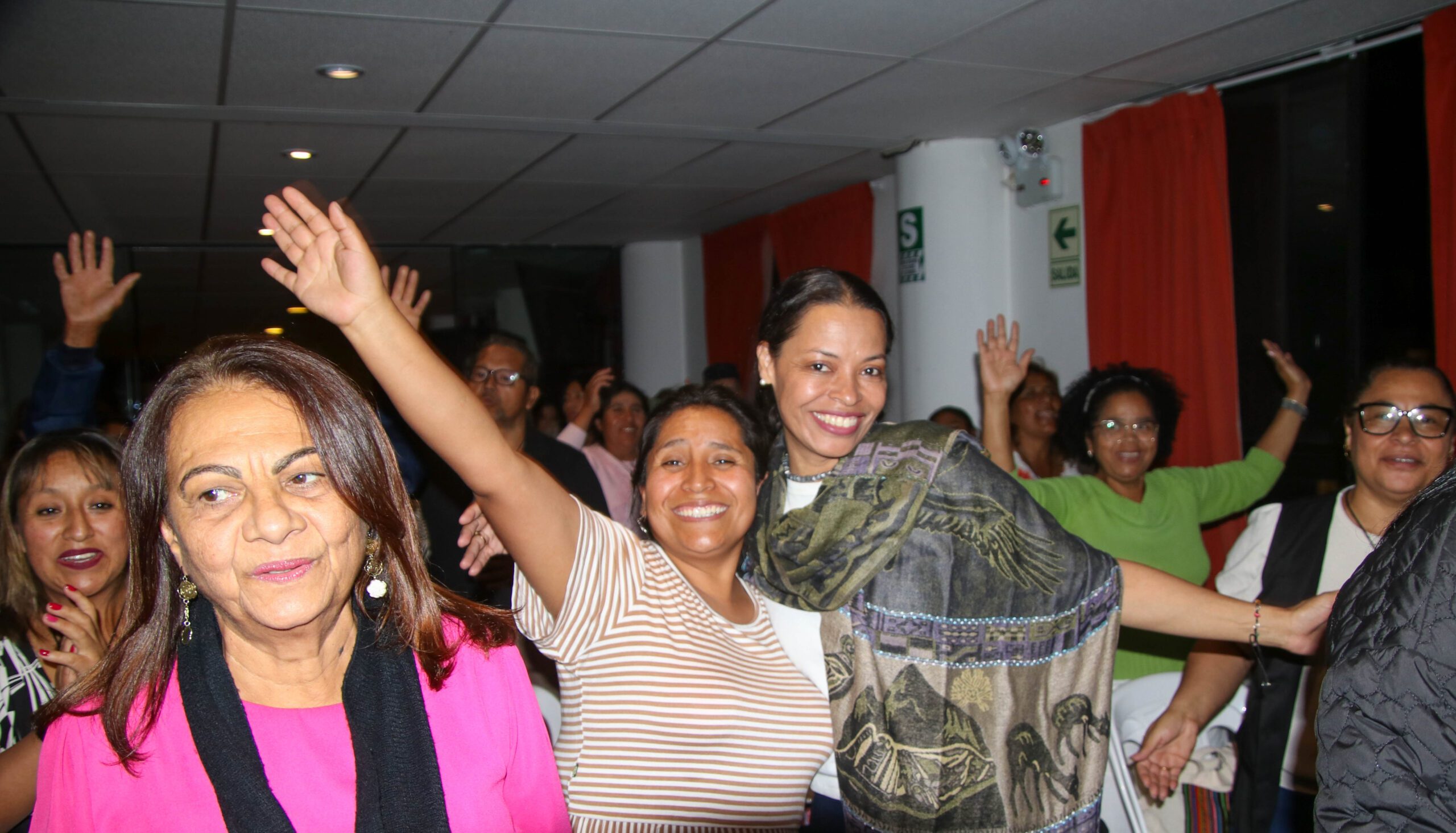Peace Sunday 2025 – Teaching Resource
Sermon on Matthew 22:34–40
“Vecino” or “vecina” (neighbour). This is one of the ways we refer to the different people around us in Bogota, Colombia, whether they live in our building, the house next door, or we meet them in a store or other shared and public places. We may know them well or not even know their name, but our relationship instantly warms when we call them “neighbour”. When we meet another person, it’s a way to transcend distance, othering, or even a conflict.
Neighbour is a term that indicates closeness. In English, this is the term used in Matthew 22:34–40. Meanwhile, in Spanish and French, “prójimo” (proximate person) is commonly used in this biblical passage. Although “prójimo” or “prójima” derive from the concept of proximate, being close or beside, it’s a term that is too abstract and divorced from daily life. Usually, we use the term prójimo/prójima to refer to a biblical passage or when we want to highlight the ethical implications of our Christian faith. We don’t usually use it when we talk about people we come across in our daily lives.
What would happen if we emphasized the closeness, warmth and everydayness of other people, as we do when we address them as “neighbour” in Bogota? How would we read this biblical passage then?
This text from Matthew is well known and seems very clear and precise. Even so, it’s possible to emphasize many different aspects or interpretations of what Jesus says.
We could highlight the connection between the “vertical” and “horizontal” nature of our faith, the relationship between our love of God and our love for other human beings. In his commentary of this text in Matthew, Richard B. Gardner1, argues that these precepts are necessarily new. Loving God with all our heart, all our soul, and all our mind appears in Deuteronomy 6:5. The notion that we love those close to us is found in Leviticus 19:182. What makes Jesus’ response so new is the interdependence between the two commandments. It’s impossible to separate the vertical and horizontal dimensions of our faith.
Another angle of interpretation could include what we understand as the connection between what we believe and how we live. It would be inconsistent to say we love God and yet we act with apathy towards the suffering of our neighbours.
It is equally illogical to say that we believe in our God of peace and justice and continue to act in oppressive and unjust ways towards everyone else. Indeed, Richard B. Gardner proposes that one of the conclusions we can draw from the text is that loving our neighbour is an action where we can embody and demonstrate God’s love for the world.3 The life of Jesus is God’s love for the world made flesh.
At the same time, as humans we are invited to embody our love of God by loving other people, and the rest of creation. Our actions toward those around us, especially those who are marginalized, are the ones that bear witness of our love of God. For this reason, we cannot separate what we understand of our faith and how we live it out.
Jesus’ response in Matthew 22 can also act like a key to understand the whole Bible. His response is a lens that helps us discern the meaning of the texts, laws and commandments that sometimes seem to be ambiguous or in conflict with each other. Richard B. Gardner relates that according to rabbinic lore dating back to the second century, the Torah contains approximately 613 laws (365 prohibitions and 248 commandments).4 When Jesus elevates the love of God and the love of our neighbours as the two most important commandments, he subjugates all the other laws and requires that they be read through the lens of loving God and neighbour.
If these observations are valuable, then this passage of Matthew 22: 34-40 continues to be a text whose interpretation is endless. Our world needs us to constantly reinterpret what the text wants to say about loving God and loving our neighbour. This is especially true during times of climate emergencies, government elections, the reappearance of xenophobic sentiments, violence in our societies, wars and genocide that have become realities that we must face every day.
¡Qué pena vecina! ¡qué pena vecino!
Continuing with the thread that we refer to people in Bogota as “neighbour”, we often say, “¡qué pena, what a pity, neighbour” when we need help or wish to apologise for something.
We live in a world in which our close relationships have become deeply distorted and violated. Often, we have been complicit in the damage. Which is why we should carefully assess how we have hurt our proximate relationships, our neighbourly relationships. Perhaps we need to confess, “Perdón vecina, perdón vecino, sorry, neighbour”.

The times we live in have made us normalize being suspicious of those in our vicinity, either because they carry different baggage, or because they are migrant, displaced or marginalized people. Whether the people around us are local or come from another place, country or region doesn’t matter because we see all of them as strangers, hostile or even enemies and criminals rather than as our neighbours. So many wars in our history and our current world occur among neighbours!
Our neighbourly relationship with nature has also been severely affected. We have converted our interdependent relationships into ones of domination and control. We view nature as a resource that we can simply exploit and capitalize on. Climate change is one of the signs of the damage we have caused and continue to cause as human beings. Our relationship with our vital space –the earth and the waters – is fatally wounded.
Perdón vecina, perdón vecino…
In the midst of all these conflicting realities, the Pharisees’ question to Jesus about which commandment is the greatest takes on special significance. How do we find guidance and reference points in our faith to deal with these distortions? Which laws should we follow? What should we do if governments, politicians and economic powers ignore humanity’s legal frameworks like international law and human rights with impunity? What can we do when governments of the day overturn the measures we’ve taken to limit our impact on the environment?
As when Jesus walked the earth, the dilemma is not only that there are thousands of laws and ethical frameworks. The dilemma intensifies because oppression and violence make it all the more urgent we find reference points, and that we reconnect with the central tenets of our faith so we can discern how to act.
“Buenos días vecina”, “buenos días vecino”.
When I talk with people who have not visited or lived in Bogota (Colombia), I often tell them how we greet one another, “buenos días vecina” or “buenos días vecino” (good morning, neighbour). It usually takes a few minutes (and examples) to explain what it sounds like and what it means. Between smiles, I never know whether I’ve done a good job of explaining how we use “neighbour” to refer to the other person, even if that person doesn’t live next door.
Each time I read this text about loving God and the people in our vicinity, with emphasis on the term “prójimo” in Spanish, I try to consciously consider possible nuances that the term neighbour connotes along with how we use “neighbour” daily in Bogota. In this sense, Jesus invites us to rethink our proximate relationships.

Paz, “bread and peace Sunday.” Photo: Comunidad Cristiana Menonita de Girardot
It is a counter cultural act to relate to the people around as neighbours when visible and invisible barriers separate us; when it’s customary to use marginalized groups as scapegoats for the problems in our communities and countries, when we are urged to see the other person as our enemy. When we act as neighbours, we go against the status quo.
Perhaps calling someone “neighbour” sounds superficial, a social codeword, or simply a term we are used to using in Bogota. However, when we refer to another person as neighbour, we create a bond of closeness, a bond that may not have existed before. This bond makes it difficult to consider them a stranger or enemy.
The distant and close relationships we have with other people are not static or rigid – they can change and form in surprising ways. Even people who consider themselves strangers or enemies can turn into neighbours. In the parable of the good Samaritan (Luke 10: 25–37), Jesus illustrates this well by showing us who our neighbour is. The Samaritans and the Jews had an uneasy relationship in Jesus’ time. And yet, Jesus finds in the Samaritan a shining example of a neighbour despite the fact that the Jews would’ve viewed him as a stranger, even an enemy.
I believe that Jesus’ response summons us precisely in this way: we must redraw our relationships of love and proximity. There are always more people who we can call our neighbours. If we latch onto the idea that loving our neighbour is how we make evident our love of God, then we must always enrich and nourish how we live out and express this love. No matter how complicated this seems, every new day, new context, new reality, is one in which we can embody the love of God with the people around us.
¿En qué le puedo ayudar vecina? ¿En qué le puedo ayudar vecino?
In Bogota, storekeepers usually ask the people who enter their stores looking for something, “how can I help you, neighbour?” What strikes me about this question is not only that they call us neighbour, but that they offer us help. In the world in which we live, we could feel bad about what happens to other people in the world, or to our neighbours. But we can opt to sympathize with their situation from afar as long as that doesn’t impinge on our comfort.
If we assume that loving our neighbour is how we express and embody our love of God, then the invitation to love our neighbour is also an invitation to act in solidarity, to discern what we should do and how we can help. Loving our neighbour cannot stop at words, it must also become an action. It’s not about having the answer or solving a problem, either. Neither can we decide for the other person what they should do. Acting with solidarity means committing to walking with others, listening to them and discerning with them how to act; it goes way beyond liking a post on Instagram or sharing a video on TikTok.
Sometimes we express solidarity through activism and attending nonviolent demonstrations and marches. Other times, we express solidarity through recognizing and confronting our privilege and serving as allies in many people’s and communities’ struggles. Solidarity can also mean finding and creating safe spaces and brave spaces to confront the varied forms of violence many people have endured. The point is not to make a long list of all the forms of solidarity; these are just signposts that solidarity means going beyond words and sympathy.
Being a neighbour also implies a series of responsibilities and precautions. There are many occasions when violence manifests in its greatest severity within our closest relationships. We rarely talk about these forms of violence and often seek to silence the voices that bring them to light. Gender-based violence, sexual violence, intrafamilial violence that we also call domestic violence, among others, reveal that being close is not a guarantee of healthy and just relationships. The sin of violence, and the deep damage it causes, can also express itself in intimate relationships. To talk of loving our neighbour as an expression of loving God reminds us of the immense responsibility we have to aid the flourishing of other people.
In other words, recognizing the other person as our neighbour is not only a way to express warmth; it also requires a commitment to be responsible and care for their well-being.
Once again, it is in loving our neighbour, the person proximate to us, that we embody our love for God.
As we celebrate 500 years of Anabaptism, and as we reflect on the chosen theme for this important occasion, The Courage to Love, it’s crucial to return to the implications and responsibilities that loving God and neighbour hold for today.
In a world where death and hopelessness seem to reign, may the voice of Jesus remind us that he should be at the centre of what we understand and how we live our faith.
May this be a time in which we think about who is our neighbour and may we treat them as such.

May this be a time in which we embrace the courage to love and create new bonds and relationships of proximity with other people, including those that we think of as improbable or even impossible.
May this also be a time of new beginnings to build new commitments to act in solidarity with others as we seek well-being together.
And may our God of Love, who loves us immeasurable and invites us to reciprocate that love through our relationships with other people and our world, continue to challenge and guide us on this path.
Amen.
—Andrés Pacheco Lozano is the chair of the Peace Commission. Originally from Colombia, he lives in Amsterdam, Netherlands. This resource is adapted from a sermon he delivered in Iglesia Cristiana Menonita De Teusaquillo in Bogota, Colombia.



